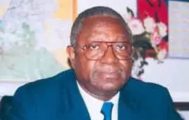Categories
Recent Posts
- Afrobeats star Davido says Nigerian culture is having a moment
- Football: Gabon forward Boupendza dies aged 28 in China
- Cameroonian youth urged to embrace hope despite multiple challenges
- Bishop of Bafoussam calls on voters to ‘make no mistake’ in this year’s election
- World Bank increases funding to Cameroon by 21%
Archives
- April 2025
- March 2025
- February 2025
- January 2025
- December 2024
- November 2024
- October 2024
- September 2024
- August 2024
- July 2024
- June 2024
- May 2024
- April 2024
- March 2024
- February 2024
- January 2024
- December 2023
- November 2023
- October 2023
- September 2023
- August 2023
- July 2023
- June 2023
- May 2023
- April 2023
- March 2023
- February 2023
- January 2023
- December 2022
- November 2022
- October 2022
- September 2022
- August 2022
- July 2022
- June 2022
- May 2022
- April 2022
- March 2022
- February 2022
- January 2022
- December 2021
- November 2021
- October 2021
- September 2021
- August 2021
- July 2021
- June 2021
- May 2021
- April 2021
- March 2021
- February 2021
- January 2021
- December 2020
- November 2020
- October 2020
- September 2020
- August 2020
- July 2020
- June 2020
- May 2020
- April 2020
- March 2020
- February 2020
- January 2020
- December 2019
- November 2019
- October 2019
- September 2019
- August 2019
- July 2019
- June 2019
- May 2019
- April 2019
- March 2019
- February 2019
- January 2019
- December 2018
- November 2018
- October 2018
- September 2018
- August 2018
- July 2018
- June 2018
- May 2018
- April 2018
- March 2018
- February 2018
- January 2018
- December 2017
- November 2017
- October 2017
- September 2017
- August 2017
- July 2017
- June 2017
- May 2017
- April 2017
- March 2017
- February 2017
- January 2017
- December 2016
- November 2016
- October 2016
- September 2016
- August 2016
- July 2016
- June 2016
Featured
 Burkina Faso: Where vision meets discipline
Burkina Faso: Where vision meets discipline  Prosecution of journalists in Cameroon: European Parliament says enough red flags have been ignored
Prosecution of journalists in Cameroon: European Parliament says enough red flags have been ignored  1982-2025: How long will Biya hang on?
1982-2025: How long will Biya hang on?  How Biya and Archbishop Nkea protected the sanctity of the family in Cameroon
How Biya and Archbishop Nkea protected the sanctity of the family in Cameroon  October Presidential Election: Will 92-year-old Biya be re-elected?
October Presidential Election: Will 92-year-old Biya be re-elected?
Most Commented Posts
 4 Anglophone detainees killed in Yaounde
4 Anglophone detainees killed in Yaounde
18 comments Chantal Biya says she will return to Cameroon if General Ivo Yenwo, Martin Belinga Eboutou and Ferdinand Ngoh Ngoh are sacked
Chantal Biya says she will return to Cameroon if General Ivo Yenwo, Martin Belinga Eboutou and Ferdinand Ngoh Ngoh are sacked
13 comments The Anglophone Problem – When Facts don’t Lie
The Anglophone Problem – When Facts don’t Lie
12 comments Anglophone Nationalism: Barrister Eyambe says “hidden plans are at work”
Anglophone Nationalism: Barrister Eyambe says “hidden plans are at work”
12 comments Largest wave of arrest by BIR in Bamenda
Largest wave of arrest by BIR in Bamenda
10 comments
Latest Tweets
Featured
-

Afrobeats star Davido says Nigerian culture is having a moment
-

Football: Gabon forward Boupendza dies aged 28 in China
-

Cameroonian youth urged to embrace hope despite multiple challenges
-

Bishop of Bafoussam calls on voters to ‘make no mistake’ in this year’s election
-

World Bank increases funding to Cameroon by 21%
-

Ukraine: Trump blames Zelensky for starting war after massive Russian attack
-

Minister Obi Eta Jerome’s death – What do we know?
© Cameroon Concord News 2025
16, July 2019
UN releases report on Southern Cameroons 0
Imagine if your family was killed in front of you. Then, with no time to process what has occurred and or grieve, you are forced to hide in the wilderness for months to save your own life. After some time, some local non-governmental organizations and UN agencies find you and provide you with food, clean water, shelter and some soap. Then one day, even that little assistance is forced to be suspended, or even worse, stopped. That is the reality that most Cameroonians in the English-speaking parts of the country live in today. It has made the crisis in the English-speaking parts of Cameroon, as well as the other emergencies in the country (related to the Boko Haram crisis in Cameroon’s Far North and the influx of refugees from the Central African Republic in Cameroon’s East and North), among the most neglected and underfunded humanitarian crises in the world. In the English-speaking North-West and South-West regions alone, there are more than 1.3 million people in need of aid – which corresponds to a third of the local population. This is an eight-fold increase compared with 2018, when 160,000 people were estimated to need humanitarian assistance in those regions.
Dorothy*
This past January, Dorothy, 65, watched her husband and three of her five children being killed in front of her. She had to find the strength to pull her two other children and run. They have been on the run and in hiding ever since.
Dorothy* has been living in the wilderness since her home was burnt down in January 2019.
“In the course of running, I even badly hurt my leg and it is still badly swollen – I cannot afford to go to the hospital and I am scared to go into the big town,” Dorothy said. “In the bush, I sleep under a tree and we don’t even have blankets, we eat mostly roasted cocoyam (taro) and plantains. There are snakes that can harm us and when it is raining, we suffer more.” Dorothy often feels the urge to return to town but fears for the lives of her remaining children. “Sometimes we go for days without bathing. I am tired of living in the bush.”
Dorothy stands at the spot where her husband and three of her children were killed in what used to be her home.
Delivering aid
The humanitarian community is working in a highly volatile environment with many access challenges, including ongoing insecurity, confiscation and impounding of humanitarian supplies, regular ghost towns and lockdowns – which can paralyse humanitarian action for days – and a few attacks on aid supplies, most recently on 23 June. Despite this very challenging operational environment, humanitarian access is possible and needs to be accompanied by the delivery of assistance, so as not to erode the trust built with the local population. Humanitarian partners continue access negotiations and have been able to reach more than 125,000 people with humanitarian assistance so far in 2019.
Locally displaced people at the weekly food distribution allowance. Each family received 5kg of rice and 1 liter of palm oil.
Peter*
Peter,* 50, is a single father of five children. Two years ago, he was managing a community water project in one of the English-speaking regions. “It was a good job and I was able to provide for my children up until the day I was attacked.” In September 2018, his right hand was cut off during an attack.
Peter is a single father of five children. His right hand was cut off during an attack.
“I immediately collapsed with blood pouring out,” he recalled. The villagers called the mayor, who rushed Peter to the hospital. “I was in the hospital for about two weeks – I wanted to come home to be with my children. It was a terrible time and I was so scared the attackers would come back and harm my children,” he said. Now living with a disability, he has no source of income. His family depends on neighbours and well-wishers to feed them. His children are at home, as the local school was closed after the teachers were threatened and quit their jobs. “We need our schools open and we need peace now.”
Schools under siege
For the past three years, a ban on education has defined the daily life of children. Today, 80 per cent of schools are closed, with some 700,000 out-of-school children, and at least 74 schools have been destroyed. Since 2018, more than 300 students and teachers have been kidnapped. After traumatic experiences, they have all been subsequently released.
Many schools have been destroyed in the English-speaking regions of Cameroon. Teachers and students have been kidnapped. The remaining schools function under tremendous pressure.
Attacks on health care
Attacks on medical staff and infrastructure have become another characteristic of the crisis. Since the beginning of the crisis, several nurses have been killed, a dozen medical staff have been kidnapped, and at least three hospitals have been burned down. Forty per cent of health facilities in the North-West and South-West regions are not operational, and the rest are only partially functional.
A combination of prevailing insecurity, lack of funding and attacks on health care professionals and facilities have led to health centres being abandoned.
Dr David Smith *
Dr. Smith is a surgeon at a hospital in the English-speaking part of Cameroon. The hospital where he works treats victims of the violent crisis, many of whom are wounded or die from gunshot wounds or machete injuries.
Dr David Smith *, a surgeon at a local hospital in one of the English-speaking regions
“We look after those who arrive pregnant from the bush and those who suffer from the difficulty of living in the bush with ailments such as malaria and snake bites,” he said. Dr. Smith says that the hospital faces many other difficult situations. “At times the military come and takes away our wounded patients – and we never hear from them ever again.” But their biggest problem is lack of qualified staff. “Doctors and surgeons don’t want to come to this region and work.” The hospital also lacks equipment. “We desperately need help to equip our theatres and wards, and urgently need maternity incubators, for instance.”
In the media
In an interview with Sky News recently, Under-Secretary-General for Humanitarian Affairs and Emergency Relief Coordinator, Mark Lowcock highlighted the crisis in Cameroon’s English-speaking regions.
Sky News @SkyNews
· Jul 12, 2019
“The international community is looking the other way.” @AlexCrawfordSky tells #Sunrise there’s been ongoing conflicts in Cameroon with separatists demanding independence, that’s led to “brutality” on both sides – “kidnapping rife, corruption rife”.http://po.st/RQkaG5
@SkyNews
· Jul 12, 2019
“The international community is looking the other way.” @AlexCrawfordSky tells #Sunrise there’s been ongoing conflicts in Cameroon with separatists demanding independence, that’s led to “brutality” on both sides – “kidnapping rife, corruption rife”.http://po.st/RQkaG5
Sky News @SkyNews
‘It’s a really harrowing, horrific situation.’@UNReliefChief Mark Lowcock reacts to @AlexCrawfordSky’s report on the independence war in Cameroon, calling it “one of the world’s least reported” and “most harrowing conflicts”.
@SkyNews
‘It’s a really harrowing, horrific situation.’@UNReliefChief Mark Lowcock reacts to @AlexCrawfordSky’s report on the independence war in Cameroon, calling it “one of the world’s least reported” and “most harrowing conflicts”.
Funding shortfall
All the efforts to provide assistance to the affected people are being jeopardized by the lack of international attention and critical lack of funding. The overall humanitarian response plan for Cameroon this year requested about US$300 million, but remains severely underfunded at only 19 per cent. For the North-West and South-West regions in particular, aid groups need $93 million to support 820,000 people with humanitarian assistance. Only $14 million has been received so far. More funding is urgently needed to sustain the humanitarian response. *Names have been changed.
Culled from the United Nations